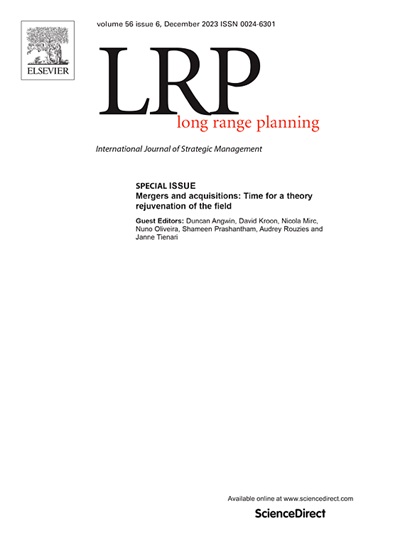家族企业ceo后裔与跨国收购:家族参与的调节作用
IF 6.3
2区 管理学
Q1 BUSINESS
引用次数: 0
摘要
研究表明,家族企业在国际化战略上表现出巨大的异质性,但后代ceo在形成这些决策中的作用仍未得到充分探讨。结合社会情感财富(SEW)视角和意愿与能力框架(WAF),我们研究了家族参与对家族企业跨境收购规模的影响。通过对370家印度上市家族企业的调查,我们发现,与创始人和外部ceo相比,后代ceo选择较小的cba,表现出明显的战略保守主义。这种对大型cba的厌恶被更高的家族所有权和更大的家族董事会代表所强化,这放大了SEW的担忧。然而,董事会中的独立董事通过鼓励更大的cba来缓和这种保守主义。我们的研究结果强调了治理结构在形成国际化战略中的微妙作用,表明家族企业的异质性,特别是CEO类型、所有权集中度和董事会组成的差异,显著影响了家族企业的风险承担。本文章由计算机程序翻译,如有差异,请以英文原文为准。
Descendant CEOs and cross-border acquisitions in family firms: The moderating role of family involvement
Research suggests that family firms exhibit substantial heterogeneity in their internationalization strategies, yet the role of descendant CEOs in shaping these decisions remains underexplored. Integrating the socioemotional wealth (SEW) perspective with the willingness and ability framework (WAF), we examine how family involvement influences the size of cross-border acquisitions (CBAs) in family firms. Using a panel of 370 publicly listed Indian family firms, we find that descendant CEOs exhibit a distinct strategic conservatism, opting for smaller CBAs than founder and outsider CEOs. This aversion to large CBAs is reinforced by higher family ownership and greater family board representation, which amplify SEW concerns. However, independent directors on the board mitigate this conservatism by encouraging larger CBAs. Our findings highlight the nuanced role of governance structures in shaping internationalization strategies, demonstrating that family firm heterogeneity, particularly differences in CEO type, ownership concentration, and board composition, significantly influences risk-taking in CBAs.
求助全文
通过发布文献求助,成功后即可免费获取论文全文。
去求助
来源期刊

Long Range Planning
Multiple-
CiteScore
13.00
自引率
7.10%
发文量
75
期刊介绍:
Long Range Planning (LRP) is an internationally renowned journal specializing in the field of strategic management. Since its establishment in 1968, the journal has consistently published original research, garnering a strong reputation among academics. LRP actively encourages the submission of articles that involve empirical research and theoretical perspectives, including studies that provide critical assessments and analysis of the current state of knowledge in crucial strategic areas. The primary user base of LRP primarily comprises individuals from academic backgrounds, with the journal playing a dual role within this community. Firstly, it serves as a platform for the dissemination of research findings among academic researchers. Secondly, it serves as a channel for the transmission of ideas that can be effectively utilized in educational settings. The articles published in LRP cater to a diverse audience, including practicing managers and students in professional programs. While some articles may focus on practical applications, others may primarily target academic researchers. LRP adopts an inclusive approach to empirical research, accepting studies that draw on various methodologies such as primary survey data, archival data, case studies, and recognized approaches to data collection.
 求助内容:
求助内容: 应助结果提醒方式:
应助结果提醒方式:


